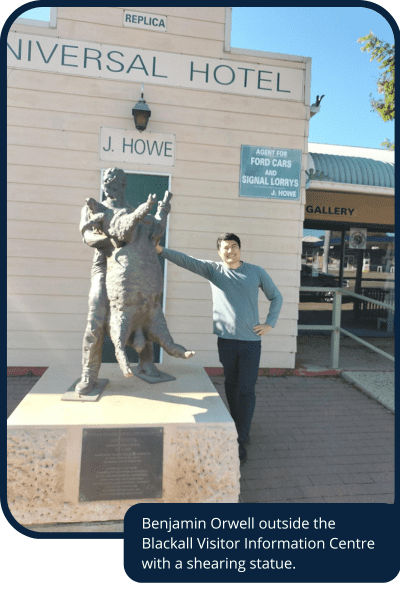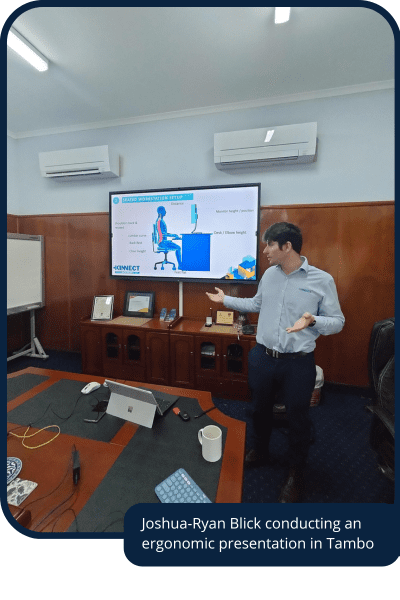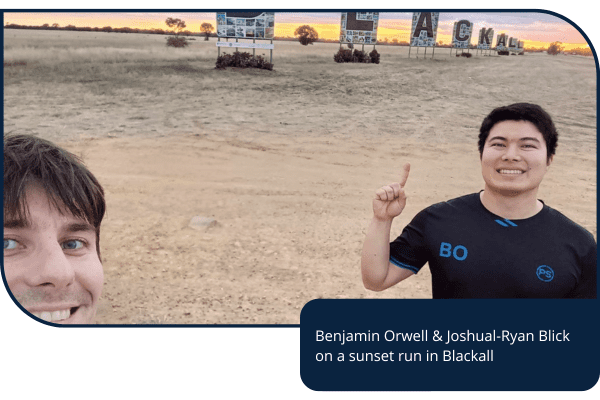Project in Outback Qld Tests Josh & Ben’s Planning Skills
One of the greatest things about working in occupational health is getting to travel to client’s worksites to deliver projects. It allows our KINNECTers to understand our client’s working environment on a deeper level and deliver services like health surveillance testing, injury prevention programs and worksite assessments in remote locations.
For consultants Joshua-Ryan Blick (Josh) and Benjamin Orwell (Ben), projects like their recent trip to Tambo and Blackall in outback Queensland are also a great chance to see more of our country and put their clinical, logistics and planning skills to the test. We spoke to them to find out about preparing for a trip, travelling with colleagues, and chicken racing.
What do your roles usually involve?
Ben: As Accredited Exercise Physiologists and Rehabilitation Consultants, we focus on helping injured workers return to their normal full duties while recovering from their injury.
We also deliver project work like manual handling training, ergonomic assessments and risk assessments. We’ll also conduct onsite drug and alcohol testing and pre-employment medicals including functional assessments, hearing, vision, and spirometry testing.
What did your recent project involve?
Josh: We travelled out to Blackall and Tambo – about 860 kilometers northwest of Brisbane – to conduct saliva drug testing, deliver ergonomic and manual handling training.
The trip itself was for two and a half days in total, but there were weeks of preparation beforehand preparing the tests, stocktaking equipment, getting travel clearance for taking the tests on a plane, arranging travel and accommodation and preparing our ergonomics and manual handling training. And then there was the paperwork!
Ben: I administered the saliva drug testing in Blackall while Josh was conducting the testing at the Tambo site. He then joined me in Blackall for manual handling training.
What was the most challenging aspect of the assignment?
Ben: The logistics and planning of the project was a challenge in itself. Also to ensure the validity of the drug test results we had to keep the testing secret until the workers arrived. This meant creating a “cover” story with the manual handling training, which they needed to complete anyway. We had to turn up at 6:30am and it was freezing cold!
Josh: Definitely the logistics of getting out there. The focus of the project was the drug and alcohol testing so to prepare we had to collate the tests plus GCMS folders in case people had a non-negative test, collect the accessories and equipment, and ensure there was going to be a solid chain of custody process so the tests weren’t invalidated for any reason.
Then we needed to have a clear plan for transporting the equipment. We ended up taking them [the tests] in carry-on luggage because of temperature control regulations – there are big temperature differences between Brisbane, the aircraft, a car and Blackall. It was interesting carrying a bag of saliva tests through security!
There was also the general logistics around travel and accommodation to think about. I went out on the first day to Longreach to pick up the car first.
This was a good test for us so we’re now reviewing how we do this if we need to do another trip out there or coordinate something similar for other clients.
What did you enjoy most about the assignment?
Ben: Sunsets, people and country food really. It was great getting to see a new town and embracing the countryside – there’s some beautiful scenery. I enjoyed being out and about and speaking to people in Blackall – everyone was so lovely and relaxed, and I got to try two local restaurants.
Josh: It’s a different experience from what we normally do. Being in a new place and getting to do those things was awesome in and of itself. Dinner at the pub in Tambo was a highlight. I also got to see chicken racing at “Schnitzel Stadium” complete with coloured chickens and race names like The Hulk!
How did you find working on this project and travelling as a duo?
Ben: It was great fun. It’s rare to be with a colleague out onsite – we’re often on our own for site visits. I enjoyed the company after work where we went for a run and dinner together.
Josh: Yeah, I enjoyed having company on an assignment and getting to work with a colleague as a team for a while. The only downside was losing my phone, but we located it quickly. A friendly cabbie did an extra trip without us to get the phone.
What would you say to other AEPs who are considering working in occupational health and workplace rehabilitation?
Ben: The variety and the opportunities where this work can take you is broader than working in a clinic or in the same gym day every day. Working at KINNECT has allowed us to travel to places we’ve never been to and get out of the city.
Josh: It’s a cliché, but no two days are the same. We get to do so many different things – you’re not stuck in the same place seeing the same people. The early starts in gyms are okay for some people, but the 9-5 works really well for me with a young family.
If you’re interested in an occupational health career that gets you out of the office and gives you real variety, search the current vacancies in our Careers Centre.